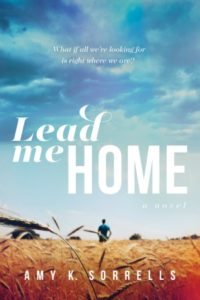The latest novel from author Amy Sorrells is the small-town drama Lead Me Home (Tyndale House). Forced to grow up too soon, Noble Burden has set his dreams aside to run the family farm. Meanwhile, James Horton, the pastor of the local church, questions his own calling as he prepares to close the doors for good. As a severe storm rolls through, threatening their community and very livelihood, both men fear losing what they care about most—and reconsider where they truly belong. In this Q&A, Amy shares her heart to encourage the broken, how small towns can crush big dreams, and what she hopes readers take away after reading the novel…
You focus on the idea of “home” in your book. Can you unpack this a little for us?
 As long as we’re on this planet we’re going to wish we were somewhere else. James struggles with wondering why God brought him to town. Noble struggles with wanting to get away from town as soon as he can. I think many people struggle with their place in the world. God gave us a longing for our eternal home that can never be fully realized on earth. All we can do is give thanks for where we are and ask Him what He wants from us while we’re here. Learning to embrace that, which essentially comes down to gratefulness, is something I have to work on. But oh the peace and joy when I remember that it’s true!
As long as we’re on this planet we’re going to wish we were somewhere else. James struggles with wondering why God brought him to town. Noble struggles with wanting to get away from town as soon as he can. I think many people struggle with their place in the world. God gave us a longing for our eternal home that can never be fully realized on earth. All we can do is give thanks for where we are and ask Him what He wants from us while we’re here. Learning to embrace that, which essentially comes down to gratefulness, is something I have to work on. But oh the peace and joy when I remember that it’s true!
Please introduce us to your two main characters.
 Pastor James Horton is the first protagonist who appears, and in my mind, he is a modern-day Jimmy Stewart type of a man who is so beloved but so blind to how much his life matters to the people around him. Broken by the recent death of his wife, as well as the impending closure of his small town church, he feels lost and purposeless until life challenges him to reconsider.
Pastor James Horton is the first protagonist who appears, and in my mind, he is a modern-day Jimmy Stewart type of a man who is so beloved but so blind to how much his life matters to the people around him. Broken by the recent death of his wife, as well as the impending closure of his small town church, he feels lost and purposeless until life challenges him to reconsider.
The second protagonist is Noble Burden. He’s a young man who wants nothing more than to follow his dreams of singing and playing music, until his father abandons their dairy farm, mother, and special needs older brother, Eustace, forcing Noble to choose between his dreams and the people he loves. He’s stubborn and handsome, rough and gentle, with a heart that pushes the boundaries of the horizons he feels have him trapped.
You focus on the idea of brokenness in your book. How do you hope to encourage the broken?
The folks in Lead Me Home have a lot of reasons to be broken. We all do. Brokenness is especially difficult when you feel like you’re alone. So much importance is placed on the big and shiny in our world that the small town, small church, and smallness of the characters’ lives might parallel how many of us feel– small, unimportant, and even invisible in the eyes of God and others when we ask for help in the midst of our trials.
I think many folks feel like they shouldn’t ask for help when neighbors struggle with something seemingly worse. But I’d like to encourage readers that no person, no place, and no trial is too small or too unnoticeable or too unworthy for our God, who is big enough not only to know us, but also to be with each of us in an intimate and personal way. I am especially grateful for God’s promise in Isaiah 42:3, that “He will not crush the weakest reed or put out a flickering candle.”
In this novel, set in rural Indiana, you explore the idea of how a small town can crush big dreams. Talk more about that.
Small towns seem like unlikely places to fulfill the American Dream, especially if the American Dream is defined by fortune and fame, riches and happiness. We are not a society which celebrates small. Whether stores or churches, dreams or accomplishments, the tendency is to create bigger and better. No wonder so many of us struggle with being satisfied with what we have and where we are. No wonder small towns, small farms, small churches and more are disappearing from our landscape. No wonder we can hardly claim to have true friendships when friendships have become defined by numbers on platforms like Facebook and Twitter. And no wonder Eustace is my favorite character in the novel.
Jesus says blessed are the poor and those who have lost what they hold dear. Blessed are those who are content and merciful and caring. Blessed are those with pure hearts, who don’t compete or fight. Matthew 5:3 (TMV) says, “With less of you there is more of God and his rule.” Not that those traits can’t be found in large venues. But I do fear what our society misses, more and more, because of the big and loud.
How is the setting of this novel important to you?
This story was inspired by my cousins and their dairy farm—one of the few remaining, family owned, sustainable dairy farms in Indiana. The parallel between small, dying churches and the demise of small, privately owned farms in our country was important to me to portray.
When we leave pieces of us—whether societal or personal—behind, which are the very things that have historically shaped and sustained us, we lose something. We lose knowledge. We lose the wisdom of generations which have gone before us. And at the end of the day, we lose a bit of our selves.
What do you hope readers take away after reading Lead Me Home?
My hope for this book is for the person who picks it up, who feels they’re too small or too broken or too invisible to matter in life, to know that they matter. Not only do they matter, they are essential and beautiful and important.
I hope it makes folks think about where God has placed them, and ask themselves why, especially if they’re unhappy or think they want to be anyplace but where they are. God cares more about our hearts than our circumstances, and sometimes we are where we are because that’s the place where God can shape us and, more importantly, where we can find Him.
I hope readers will think about the still, small places neglected in their own lives, and that they will pay closer attention to the whispers of God all around them. And most of all, I hope they’ll see that just like in Lead Me Home, God often uses the least expected, disregarded people and places in our lives to save us.


